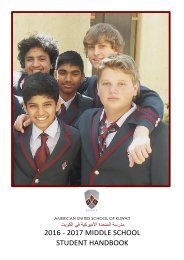AUS_HS_Student Handbook2016-17 rev 6 16 16 -003- (1)
You also want an ePaper? Increase the reach of your titles
YUMPU automatically turns print PDFs into web optimized ePapers that Google loves.
Courses<br />
A complete list of academic courses offered can be found in the High School Course Description Guide. It is located as a link under<br />
the Academics Tab on our website.<br />
Core Courses<br />
Core courses are the foundational learning program of the High School experience. Each student in the High School will learn in<br />
full year core courses in Mathematics, English Language Arts, Social Studies, Science, Physical Education and Arabic. <strong>Student</strong>s of<br />
Islamic faith are required to learn the Quran in a full year course as well. <strong>Student</strong>s are required to take the following courses<br />
each year: Math, English/Language Arts, Science, Social Studies, as well as the elective courses that are offered. Arabic students<br />
are required to take Arabic and Islamic Studies as required by the Ministry of Education.<br />
Fine Arts and Technology<br />
Fine Arts courses are designed to expose high school students to visual arts, theater and music. These courses promote student<br />
creativity and develop deeper understanding of artistic concepts. In Grade 9 and 10, all students have an opportunity to select a<br />
variety of courses in art, drama, technology and music. These elective courses build on the overall foundational experience for<br />
student learning, assisting in developing more sophisticated skills and concepts in the arts, music and technology. All students at<br />
<strong>AUS</strong> High School have the opportunity to participate in a Drama, Theatre and Music permitting there is enough interest. If you<br />
play an instrument, or would like to, you can sign up for band/orchestra. The band/orchestra is involved in performances and<br />
other programs in and out of school.<br />
Homework<br />
Educational research confirms that homework that is relevant, meaningful, connected to classroom learning and that receives<br />
timely feedback has a positive impact on student learning, habits of mind, and attitudes toward learning. Homework may<br />
include studying for an assessment, <strong>rev</strong>iewing or practicing concepts learned in class, working to complete a project / essay /<br />
assignment, preparing for an upcoming topic by doing research or reading, etc. Homework is assigned and explained by teachers<br />
during class time and recorded in the student portal and/ or Google Classroom. Planning for short and long term homework<br />
assignments is necessary. <strong>Student</strong>s should arrange a homework area that is free from distraction, and should expect to do<br />
approximately two uninterrupted hours of homework each night under normal circumstances. If it is the case that your child<br />
appears to excessive homework in a subject, please initiate contact with the teacher so that he or she can examine the situation.<br />
Homework Guidelines:<br />
1. Homework is a school related assignment which requires time and effort outside the regular classroom.<br />
2. Homework shall be meaningful and have purpose aligned to course standards.<br />
3. Homework shall be prescriptive and differentiated to meet the needs of teachers’ diverse student populations.<br />
4. Assignments may vary upon subject, but need to be designed so students may do one or more of the following:<br />
a. Practice and reinforce fundamental skills to meet course objectives.<br />
b. Aid in processing needed information to demonstrate mastery.<br />
c. Provide an opportunity to increase their learning ability through independent experiences with resources<br />
found outside of a classroom setting.<br />
d. Develop regular study habits, responsibility, and self-discipline, which are needed skills to budget their time<br />
effectively and work independently.<br />
e. Engage in shared learning experiences with family.<br />
f. Enhance concepts taught in class and may reinforce real world applications.<br />
5. Communication between students and teachers should be established concerning individual circumstances that may<br />
exist within families. <strong>Student</strong>s should be able to complete assignments independently.<br />
Assessments<br />
Assessment drives the cycle of teaching and learning. Teachers provide a variety of quality assessments for students to<br />
demonstrate their progress toward mastery of standards and benchmarks. These assessments are designed to gather<br />
information about individual students in order to inform, enhance, and improve the teaching and learning cycle. This is also<br />
necessary in order to communicate clearly on each student’s progress towards the learning goals. <strong>Student</strong> learning and grading<br />
is based on criteria or standards for performance rather than through comparison with other students. <strong>Student</strong>s are given a<br />
clear understanding of expectations for performance through the provision of exemplars, rubrics, checklists and other<br />
indicators. <strong>Student</strong>s are active participants in the process.<br />
7
















